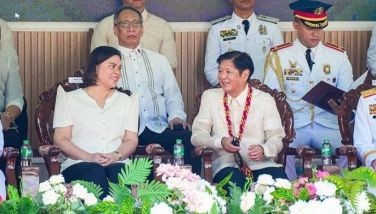NGO linked to Cabinet execs gets monopoly of gov’t projects
MANILA, Philippines - A non-government organization identified with at least two Cabinet officials has apparently cornered the bulk of projects to be funded by a multibillion-peso lump sum provision in the proposed P2.606-trillion national budget for 2015, an opposition lawmaker said yesterday.
Kabataan party-list Rep. Terry Ridon cited an “apparent monopoly” of Caucus of Development NGO Networks (CODE-NGO) over the task of identifying projects to be funded by P20.9-billion appropriation under the so-called “Grassroots Participatory Budgeting (GPB)” program, which he stressed was similar to the outlawed Disbursement Acceleration Program (DAP).
The lawmaker noted that during the Arroyo administration, CODE-NGO was implicated in a large-scale controversy involving the Poverty Eradication and Alleviation Certificates (PEACe) bonds, from which CODE-NGO reportedly made a profit of about P1.8 billion.
He said CODE-NGO was allegedly allowed to pocket proceeds from the PEACe bonds by the Arroyo administration as a reward for the group’s support for the ouster of President Joseph Estrada.
Ridon said Social Welfare Secretary Corazon Soliman and Presidential Adviser on the Peace Process Teresita Deles – whose agencies are receiving funds from the GPB – were former CODE-NGO heads and were also implicated in the PEACe bond scam.
“Soliman and Deles, both of whom were previously connected to CODE-NGO, are receiving billions from the GPB through their agencies. With CODE-NGO having a virtual monopoly in determining projects that will be funded through GPB, doesn’t Soliman and Deles’ participation constitute an apparent conflict of interest?” he said.
The two Cabinet officials held the same positions during the previous administration until they had a falling out with then President Arroyo in 2005.
Ridon said the Department of Budget and Management (DBM) defined GPB as “an approach to preparing the budget proposal of agencies, taking into consideration the development needs of cities/municipalities as identified in their respective local poverty reduction action plans that shall be formulated with strong participation of basic sector organizations and other civil society organizations.”
Under the GPB process, LGUs were asked to come up with a “wish list” of P15 million worth of projects that they want to be funded by the national government, through consultations with so-called local basic sector organizations (BSOs) and civil society organizations (CSOs).
When the mechanism started in 2013, the fund under GPB reached P8.4 billion spread over 595 municipalities. For 2014, the budget under GPB soared to P20.03 billion spread over 1,226 municipalities, almost at par with the budget for the now defunct Priority Development Assistance Fund (PDAF), he said.
In 2015, the government announced that the GPB would again be expanded to include all municipalities and have a budget amounting to P21 billion.
“It is important to note that while the relevant memorandum circulars pertaining to GPB allow the broad participation of CSOs and people’s organizations, it has been revealed that about 300 CSOs belonging to CODE-NGO have almost a virtual monopoly on seats in the Local Poverty Reduction Action Team (LPRAT) of the 1,233 cities and municipalities under GPB,” Ridon said.
The LPRAT – which is tasked to identify programs and projects to be funded under GPB – is composed of local government officials, representatives of National Government Agencies (NGAs) and CSOs. The LPRAT is chaired by the local chief executive and co-chaired by a CSO representative.
He said in many instances, CSO representatives in whole provinces come from only one or two CODE-NGO member organizations.
Such monopoly on the representation of grassroots organizations leaves room for doubt on the actual participatory character of GPB, Ridon said.
“CODE-NGO’s apparent monopoly in the participation in the GPB process actually excludes other peoples’ organizations from taking part in the process, and perpetuates a system of patronage politics that excludes the marginalized sectors while giving more room to those who are well-entrenched in government,” he said.
He maintained the GPB was vulnerable to corruption, prone to patronage politics and is a “DAP-clone.”
He said a review of the pertinent documents on GPB reveals that there is no provision disallowing CSOs from actually taking part in the implementation stage, thus leaving room for them to also act as suppliers for certain projects.
“It may be remembered that such scheme has been allegedly used by the so-called ‘Napoles NGOs’ to funnel funds from PDAF,” Ridon said.
- Latest
- Trending




























